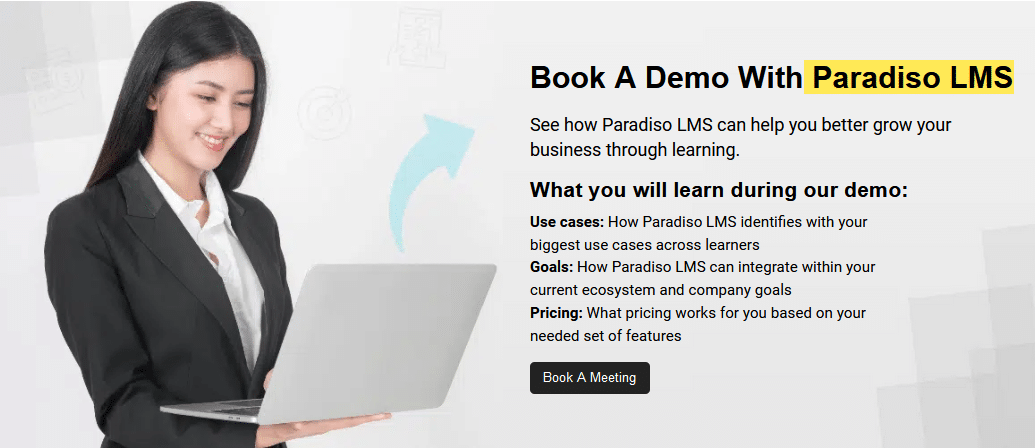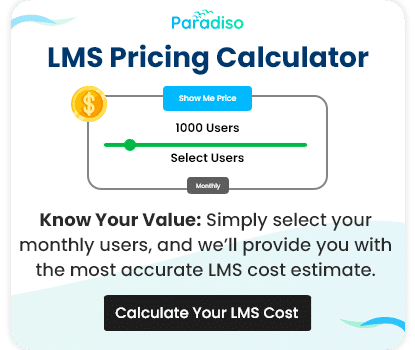Partner training is an important but sometimes disregarded aspect of job training. In today’s competitive business environment, effective partner training is essential for building strong, knowledgeable, and motivated partner networks.

The Absolute LMS Guide: Best LMS for Partner Training
The right Learning Management System (LMS) can streamline this process, providing a centralized platform for delivering consistent, engaging, and scalable training programs. “The Ultimate LMS Guide: Best LMS for Partner Training” explores the top LMS solutions designed to enhance partner education and performance. This comprehensive guide covers key features, benefits, and considerations to help you select the best LMS for your organization’s unique needs.
What is partner training?
Partner training involves educating and equipping an organization’s external partners, such as distributors, resellers, and affiliates, with the necessary knowledge and skills to effectively promote, sell, and support its products or services. This training ensures that partners are aligned with the company’s standards and practices, enhancing their performance and fostering stronger business relationships.
This kind of training is part of a larger concept known as “extended enterprise learning,” which involves training your partners, customers and employees.
How to effectively design a partner training program
Designing an effective partner training program involves a strategic approach to ensure it meets the needs of your partners and achieves your business objectives. Here are the key steps:
Define Clear Objectives:
Start by defining the objectives of your partner training program. Clearly articulate what you aim to achieve through the training, whether it’s improving sales effectiveness, enhancing product knowledge, ensuring compliance, or fostering stronger partnerships.
Understand Partner Needs:
Conduct thorough research to understand the needs, preferences, and challenges of your partners. This can be done through surveys, interviews, or discussions with key stakeholders. Consider the diverse roles and responsibilities of your partners and tailor the training content accordingly.
Develop Comprehensive Training Content:
Based on the objectives and partner needs, develop comprehensive training materials. Include essential topics such as product features, sales techniques, customer service standards, and any specific policies or procedures relevant to your partners. Use a mix of formats like videos, interactive modules, case studies, and quizzes to engage different learning styles.
Choose the Right Learning Platform:
Select a suitable Learning Management System (LMS) that aligns with your training objectives. Look for customization options, scalability to accommodate growth, mobile accessibility for flexibility, and robust analytics for tracking partner progress. Ensure the LMS integrates smoothly with your existing systems to streamline data management and reporting.
Create a Structured Training Plan:
Develop a structured training plan that outlines the curriculum, schedule, and delivery methods. Determine whether the training will be self-paced, instructor-led, virtual, or combined. Provide clear timelines and expectations to help partners manage their learning journey effectively.
Implement Assessments and Feedback Mechanisms:
Incorporate assessments, quizzes, or practical exercises throughout the training program to gauge partners’ understanding and retention of the material. Offer certifications or badges upon successful completion to incentivize participation and acknowledge achievements. Additionally, gather feedback from partners to improve the training content and delivery continuously.
Provide Ongoing Support and Resources:
Offer continuous support to partners throughout their training journey. Provide access to resources such as FAQs, knowledge bases, forums, and dedicated support channels where partners can seek assistance and clarification. Keep the content updated with the latest information and best practices to ensure relevance.
Monitor Performance and Progress:
Utilize the analytics and reporting capabilities of your LMS to track partner performance and progress. Monitor metrics like completion rates, quiz scores, engagement levels, and feedback to assess the training program’s effectiveness. Use this data to identify areas for improvement and make data-driven decisions.
Foster Engagement and Participation:
Foster a culture of engagement and participation among partners by creating interactive learning experiences. Incorporate gamification elements such as leaderboards, rewards, and badges to motivate partners and encourage healthy competition. Encourage collaboration through group activities, discussion forums, or peer-to-peer learning opportunities.
Insider Tips To Choose The Perfect Learning Management System
Download now to get insider tips on choosing the perfect Learning Management System!

Discover three significant types of partner trainings
Depending on the goals and requirements of the organization and its partners, partner training can take many different forms. Three important categories of partner trainings are as follows:
Product Training:
Product training is crucial for partners to understand the features, benefits, and applications of the company’s products or services. This type of training equips partners with the knowledge needed to effectively promote, sell, and support the products in the market. Product training often includes detailed information on product specifications, use cases, competitive positioning, and how to address customer questions or objections.
Sales and Marketing Training:
Sales and marketing training focuses on equipping partners with the skills and strategies to effectively sell and market the company’s products or services. This includes training in sales techniques, objection handling, negotiation skills, creating compelling pitches, and understanding the sales process. Marketing training may cover branding guidelines, marketing campaigns, lead generation tactics, digital marketing strategies, and leveraging marketing collateral.
Compliance and Regulatory Training:
Compliance and regulatory training ensure that partners adhere to industry regulations, company policies, and legal requirements when conducting business. This type of training is essential in industries with strict compliance standards, such as healthcare, finance, and pharmaceuticals. It covers topics such as data protection laws, safety regulations, ethical standards, and industry-specific guidelines. Compliance training helps mitigate risks and ensures partners operate within legal and ethical boundaries.
Each type of partner training plays a critical role in enhancing partner knowledge, skills, and alignment with the organization’s goals, ultimately contributing to improved partner performance and stronger business relationships.
5 Essential features of Paradiso LMS to support partner training
Selecting Paradiso LMS will help your partner training efforts soar. It has a track record of boosting revenue growth and brand loyalty while saving a lot of time and money for businesses. What are the features that Paradiso LMS provides to make it one of the best LMS to support partner training?
- Customization Options: Paradiso LMS provides robust customization capabilities, allowing organizations to tailor the learning experience to the specific needs and branding requirements of their partners. This includes customizing course content, branding the interface, and adapting the platform to align with partner roles and learning objectives.
- Mobile Accessibility: The LMS is designed with mobile accessibility in mind, enabling partners to access training materials anytime, anywhere, from their preferred devices. This flexibility ensures that partners can engage in training at their convenience, whether in the office, on the go, or remotely.
- Integration Capabilities: Paradiso LMS offers seamless integration with various third-party applications and systems, such as CRM (Customer Relationship Management) and ERP (Enterprise Resource Planning) platforms. This integration streamlines data management, enhances workflow efficiency, and provides a unified view of partner interactions and performance metrics.
- Analytics and Reporting Tools: The LMS includes robust analytics and reporting features that provide valuable insights into partner engagement, progress, and performance. Organizations can track completion rates, quiz scores, and participation levels to assess the effectiveness of training initiatives and identify areas for improvement.
- Support and Collaboration Features: Paradiso LMS supports collaboration and communication among partners and between partners and the organization. Features like discussion forums, messaging systems, and collaborative tools facilitate knowledge sharing, peer-to-peer learning, and ongoing support, fostering a collaborative learning environment.
What are the benefits of using an LMS for partner training
Using a Learning Management System (LMS) for partner training offers several significant benefits:
1. Enhanced Partner Engagement:
Vendors and partners can communicate with each other through excellent channel partner training LMS systems. They make it easier for people to share alerts, notes, and evaluations on training outcomes. It encourages improved communication between the two sides while increasing engagement and interaction.
2. Improved Product Understanding:
One useful tool for channel partners to improve their partners’ product understanding is an LMS. It gives them access to resources and training materials suited to their needs. It streamlines the onboarding process, keeps them up to date on new product releases, and gives them the tools they need to provide better customer service.
3. Increased Revenue:
Business growth can be accelerated by providing partners with information and expertise via an LMS software channel partner. Partners may increase revenue and create mutually beneficial partnerships by providing better customer service and selling more effectively with the help of dynamic product training.
4. Performance Tracking:
LMS provides robust analytics and reporting tools that allow organizations to track partner progress, participation rates, quiz scores, and completion rates. These insights enable managers to identify areas where partners may need additional support or training and measure the overall effectiveness of the training program.
5. Compliance and Risk Management:
For industries with strict regulatory requirements, LMS can help ensure partners receive training on compliance regulations, safety protocols, and legal standards. This reduces risks associated with non-compliance and demonstrates a commitment to regulatory adherence.
6. Brand Consistency:
Finally, a strong channel partner training LMS guarantees brand consistency throughout your partner network, improves communication and product understanding, spurs revenue development, and makes tracking and reporting easier.
Tips and tricks to choose the best LMS for partner Training
To choose the best LMS for partner training, consider the following tips and tricks:
- Define Requirements: Clearly outline your training objectives and specific needs.
- Evaluate Customization: Ensure the LMS offers robust customization options for branding and content.
- Check Scalability: Choose an LMS that can grow with your partner network.
- Assess Integration: Verify seamless integration with your existing systems like CRM and ERP.
- Ensure Mobile Accessibility: Make sure the LMS is accessible on mobile devices for flexible learning.
- Review Analytics: Look for comprehensive analytics and reporting tools to track progress and effectiveness.
- Prioritize User Experience: Select an intuitive and user-friendly platform.
- Consider Support: Evaluate the vendor’s customer support and available training resources.
- Check Security: Ensure the LMS adheres to data security and compliance standards.
- Research Reviews: Read customer reviews and seek recommendations from industry peers.
Let’s discover Paradiso LMS helps you create advanced partner training programs.
Paradiso LMS helps you create advanced partner training programs by offering a customizable, scalable platform that integrates seamlessly with existing systems like CRM and ERP. With robust analytics, mobile accessibility, and user-friendly design, Paradiso LMS ensures partners receive consistent, engaging, and accessible training. Its comprehensive support and security features further enhance the training experience, allowing organizations to effectively equip their partners with the necessary knowledge and skills to drive business growth.
By investing in partner training software that is appropriate for your needs, you can help your partners become more proficient and guarantee that your training programs are successful in reaching your goals. Explore its sophisticated features and streamline your partner training process by taking advantage of the free demo.











